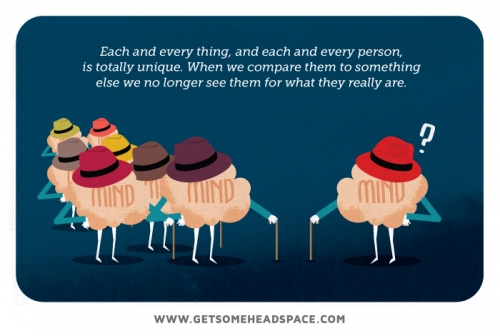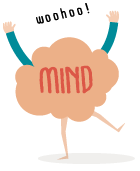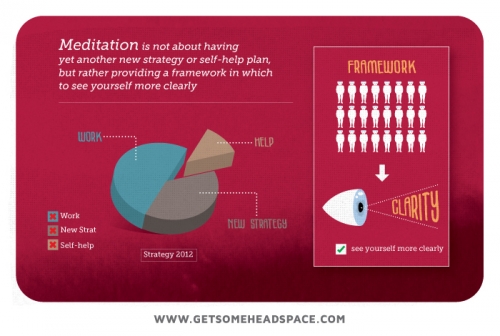Andy Puddicombe is a registered clinical mindfulness consultant and a former Buddhist monk. He is the author of Get Some Headspace and the founder of Headspace, a project that aims to make meditation accessible and easy-to-learn. Over the past 24 weeks, Andy has primed us for a life of mindfulness and kindly fielded all our meditation questions as Tricycle’s resident meditation doctor. This week marks the last of Andy’s “Introduction to Mindfulness,” and your last chance to ask him all your burning meditation questions. As a farewell, we’ve collated some of his most popular posts from weeks past below.
Opinions, Opinions
Is it a good thing or a bad thing to have strong opinions? There was once a time when being “opinionated” was considered a rather negative quality, but it seems as though it’s increasingly fashionable to have an opinion. In fact, to be seen to have no opinion, is now seen as nothing short of uneducated in some circles. But is this always such a good thing? Does a strong opinion reflect a mind that is open, curious, and interested, a mind that understands change, the fleeting passage of thought and the vagaries of emotion? Or does it reflect a mind that is closed, fixed, final—a mind that believes in a permanent position and identifies completely and wholeheartedly with every single thought or feeling?
As much as that may sound like an answer, just another opinion, it really is more of a question, something to reflect upon. There’s no doubt that we need opinions to live a healthy life, and at the same time they help us to make sense of the world, to feel safe and secure, certain and sure. They take the edge off the inherent vulnerability of life. But is it possible to have an opinion whilst open to the possibility of another outcome, an opinion that has the potential to move, to shift, to change?
One of my teachers once said to me “The secret to meditation is to always remember that anything you think is right could be wrong, and anything you think is wrong could be right. Never assume anything and always be prepared to give up everything you have ever believed in. Nothing is ever certain, so keep an open mind.” Unsurprisingly, I found these words just as applicable to everyday life as I did to meditation. Because having an opinion is really no big deal. In fact, opinions only become a problem when we are so firmly attached to the idea that we can no longer see things clearly and objectively, when we can no longer see things through the eyes of others. So maybe it’s not opinions that are the problem; maybe it’s just the way we relate to them sometimes.
Top Tips for Lightening Up

Ever feel like its all getting a little heavy? Here are top tips for lightening up…
Get some headspace:
When the mind is very busy and constantly lost in thought, it’s difficult to feel at ease and see things clearly. In these situations life can often feel confusing and stressful. So why not kick off spring by learning a new skill like meditation to give yourself a little more headspace each day?
Reassess your perspective:
It’s surprisingly easy to develop an unhealthy attitude towards life. But it’s important to acknowledge that this is simply a habit, built up over time. You’re not obliged to continue feeling this way, and by simply acknowledging how you view life, the habit will begin to unwind. In fact, it’s often possible to realign your perspective altogether.
Let go of old baggage:
How much of the past are you carrying around on your shoulders? Wouldn’t it be nice to put it all down and move on in life? Living life in the present, being more mindful, means that rather than dwelling on the past or projecting into the future, you are better able to enjoy the here-and-now. Try putting that old baggage down and see how it feels.
Take time to smell the roses:
Appreciating the little things in life really can make all the difference. Life gets heavy when we spend too much time thinking about what we want and what we haven’t got, rather than being grateful for all the things we have got. So commit to appreciating at least 3 small things each day. Write them down in a diary each evening if it helps.
Find a sense of play:
When did life get so serious? Responsibilities, commitments and an over-full datebook can easily leave you feeling despondent and in need of a lift. So find a way to inject some fun in to your life. Maybe it’s a new hobby, spending time with friends, or even just watching a great comedy. Whatever it is, there’s nothing like laughter to bring some lightness to life.
Relinquish some control:
Does it sometimes feel like you’re banging your head against a brick wall? Do you worry you might be turning in to a control freak? Sure, there are some things which we need to apply a healthy dose of will power to in life, but life has a momentum of its own and often the best approach is to step back and watch things unfold rather than trying to force an issue or result.
Notice life changing in and around you:
When you repeat things over and over in the mind they create what’s known as “a habitual pattern of thought.” This can feel very solid, very heavy. In fact if you do it for long enough, then it can be tempting to think that this is a permanent state of affairs. But if you look a little more closely you’ll see that everything and everyone (including yourself) is always changing. This simple observation can bring about a renewed sense of freedom.
Share the love:
How kind are you to others? What about to yourself? Most people report experiencing a lot of critical and judgmental thoughts throughout the day aimed at themselves or those around them. But science has shown that when we inject a little more kindness or compassion into our lives, the part of the brain which is responsible for feelings of happiness becomes far more active. So it’s not just the people around you who benefit from this approach—you will as well.
Find a middle way:
Extremes can be a lot of fun when applied in small doses, but when life is a never-ending roller coaster it’s almost impossible to find a genuine sense of lightness. Applying a sense of balance in life doesn’t mean giving up doing the things you love to do, but instead finding a way to live with enough balance and emotional stability that you no longer feel at the mercy of your mind.
Don’t take yourself too seriously:
The very best of way of finding some lightness this spring is to simply take yourself a little less seriously. This is a tricky one. It doesn’t mean negating responsibilities or commitments, nor does it mean forgetting your unique, inherent value. What it means is to let things come and go a bit more, and finding some ease in life, some laughter. You know what it’s like to see someone taking themselves too seriously, right? Need I say more?
Why We Don’t Do It, When We Know It Feels Good
Just recently I received the following tweet…
“Just finished today’s Take10. I might find daily excuses not to do it, but I’ve never not felt better after it…”
I love this tweet, because it echoes a sentiment that I hear from people all the time, and I think it perfectly sums up both the challenge and the paradox facing anyone trying to establish or maintain a regular meditation practice.
It’s the craziest thing, right? We’re talking about 10, 15 or 20 minutes a day. This is an amount of time that we wouldn’t think twice about putting aside for a cup of tea, a sitcom, or book, and yet when we think of meditation there’s all of a sudden just not enough time in the day.
And of course we are masters at this self-deception. We might even have a protracted discussion in our mind about how we are so busy, that there is just no time, how maybe we’ll squeeze it in later. In fact this internal conversation might sometimes take as long as, oh, I don’t know, say 10, 15 or 20 minutes?
Maybe it’s because sometimes we think of meditation as a chore. But it would be far better to base your opinion of meditation on your experience rather than a projected idea of what it is. It’s simple, really: you try it, and if you feel better, you will probably want to do some more. That way a very healthy relationship with meditation develops, one which is sustainable.
That brings us to this curious paradox mentioned in the tweet. Even though we know it makes us feel better, we don’t necessarily do it. In fact I often speak to people who have fallen off the proverbial meditation wagon, and they will say, “wow, I used to feel so good when I meditated every day,” and I’ll say, “sure, so why don’t you still do it now?” and they’ll usually say something like “hmmm, good question, not sure really.”
Hence the importance of taking time to reflect exactly how you feel after each meditation. Because the mind—if it is anything like mine—is not always so quick to learn. It sometimes needs prompting, prodding, reminding, and reflecting in order to actually establish that this is something positive, something that leaves you feeling physically more relaxed, mentally more calm, and emotionally more grounded and in touch with how you feel.
So, let go of any lingering self-deceptions and commit to a daily practice. You know you want to and you know you’ll feel better for it, so why would you want to do otherwise?
Resolutions
 When I used to live in the monastery, one of the things we had to do at the end of each day was sit down for five minutes and reflect on the day that had passed. It usually felt like I needed a lot longer, but it was purposely kept short so that we wouldn’t get caught up in lots of analysis. The idea wasn’t to get all daydreamy or to be judgmental, but rather to look back objectively on which things in the day had led to a positive outcome and which things had led to a negative outcome.
When I used to live in the monastery, one of the things we had to do at the end of each day was sit down for five minutes and reflect on the day that had passed. It usually felt like I needed a lot longer, but it was purposely kept short so that we wouldn’t get caught up in lots of analysis. The idea wasn’t to get all daydreamy or to be judgmental, but rather to look back objectively on which things in the day had led to a positive outcome and which things had led to a negative outcome.
So, if we realized that we’d said something to someone that had caused offense or hurt in some way, then it was an opportunity to acknowledge it, make it right if appropriate, and, most importantly of all, make the intention not to repeat the same mistake again in the future. Equally, if we’d done something which was the cause for someone else to be happy, then it was an opportunity to make the intention to repeat that action in the future. By doing this systematically and on a daily basis, it was a way of refining action, speech, and even thought.
Because, let’s face it, we all have patterns of thought that are sometimes better not engaged with or indulged in, and by acknowledging that and making the resolution to be aware of that tendency in the future, we are that much more likely to be aware of it. This not only leads to a better understanding of your challenging thoughts or emotions, but can shift your perspective to such a degree that you no longer even experience them as your own—such is the power of awareness.
Thinking back to the past and making plans for the future may at first sound counterintuitive when you are seeking to live life in the present, but it’s only with awareness of the present moment, a willingness to sit down and reflect and resolve right now, free from distraction, that you can make genuine, long-lasting and sustainable change for the future.
So, whether you choose to make your own resolutions on a daily basis, as we did in the monastery, or just once a year on the 1st of January, take a few minutes to sit down and reflect on what things increase your sense of happiness and wellbeing—and the happiness and wellbeing of those around you—and what things have the opposite effect. It sounds obvious, and yet so often we forget this or miss the opportunity to make a better choice because we are so caught up in our own thoughts. So, be confident in your resolutions, follow them through and get to experience the benefits you’re looking for.
